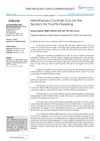 4 citations,
January 2021 in “Skin appendage disorders”
4 citations,
January 2021 in “Skin appendage disorders” Trichodynia is a painful scalp condition not directly linked to the amount or type of hair loss and may involve psychological factors, with treatments showing mixed results.
 11 citations,
June 2017 in “British Dental Journal”
11 citations,
June 2017 in “British Dental Journal” Most UK dental schools don't teach non-surgical facial aesthetics, but dentists have a good knowledge base to provide these services.
15 citations,
May 2013 in “Ophthalmic Plastic and Reconstructive Surgery” Botulinum toxin injections greatly reduced pain in Parry-Romberg syndrome.

Botulinum toxin injections can reduce hair loss and stimulate new hair growth in some men with male pattern baldness.
 50 citations,
November 2010 in “Plastic and Reconstructive Surgery”
50 citations,
November 2010 in “Plastic and Reconstructive Surgery” Botox increased hair count in men with baldness and might work by improving scalp blood flow.
26 citations,
April 2006 in “Cephalalgia” Botulinum A toxin injections reduced pain and promoted hair regrowth in a woman with a rare form of alopecia areata.
 April 2016 in “Journal of Clinical Research in Dermatology”
April 2016 in “Journal of Clinical Research in Dermatology” A woman had skin and hair issues after a botulinum toxin injection.
 14 citations,
August 2017 in “Dermatologic surgery”
14 citations,
August 2017 in “Dermatologic surgery” Men are getting more facial fillers, and doctors should use different techniques and fillers for men's unique facial features to get natural results.
 July 2024 in “Journal of the American Academy of Dermatology”
July 2024 in “Journal of the American Academy of Dermatology” Botulinum toxin may help treat male pattern baldness.
26 citations,
July 2005 in “Optometry and vision science” Botulinum A toxin injections may cause hair loss on the face and loss of eyelashes.
13 citations,
March 2013 in “The Laryngoscope” Botulinum toxin type A injections are the preferred treatment for Frey's syndrome after parotid surgery.
1 citations,
June 2011 in “대한구강악안면외과학회지” A woman had a cyst in her salivary gland, likely from Botox, which was removed and confirmed as an epidermoid cyst.
3 citations,
March 2022 in “Transgender Health” More research is needed to improve lower body gender affirmation techniques.
May 2022 in “Journal of Neurology Neurosurgery & Psychiatry” Erenumab significantly reduced migraine days or severity in most patients after 3 months.
 January 2022 in “Journal of Skin and Stem Cell”
January 2022 in “Journal of Skin and Stem Cell” Trichodynia is a painful scalp condition needing targeted treatments beyond symptom management.
3 citations,
January 2022 in “Neurotoxicity Research” Botulinum toxin may help reduce stress-related hair loss.
2 citations,
January 2021 in “PubMed” Botulinum toxin type A may help treat hidradenitis suppurativa.
 July 2023 in “Journal of Plastic Reconstructive and Aesthetic Surgery”
July 2023 in “Journal of Plastic Reconstructive and Aesthetic Surgery” The study shows the UK's injectable aesthetic industry is diverse and under-regulated, posing risks to patients.
 January 2004 in “Side effects of drugs annual”
January 2004 in “Side effects of drugs annual” Certain skin drugs and topical agents, including some natural extracts and fragrances, can cause allergic reactions. Some hair dyes and extensions, as well as minoxidil, a hair growth treatment, can also cause allergies. Botulinum toxin A can effectively reduce sweat but may have temporary side effects.
December 2021 in “Intisari Sains Medis” Botulinum toxin injections improved hair thinning in a woman with hair loss.
 March 2017 in “Trichology and cosmetology:”
March 2017 in “Trichology and cosmetology:” Cosmetic procedures can improve skin appearance and boost confidence.

Onabotulinum toxin A may help treat trichotillomania and promote hair growth.
 8 citations,
August 2018 in “International Journal of Dermatology”
8 citations,
August 2018 in “International Journal of Dermatology” The document concludes that doctors should carefully consider off-label drug use in dermatology and always inform patients, while more research is needed on the safety and effectiveness of such practices.
 April 2016 in “Journal of Investigative Dermatology”
April 2016 in “Journal of Investigative Dermatology” Microneedle arrays deliver botulinum toxin effectively for sweat suppression, similar to injections.
2 citations,
January 2017 in “Clinical approaches and procedures in cosmetic dermatology” The document concludes that understanding skin structure is essential for effective cosmetic treatments.
 15 citations,
August 2020 in “BioMed Research International”
15 citations,
August 2020 in “BioMed Research International” BTA safely and effectively treats hair loss, and works better with FNS.
 7 citations,
December 2023 in “Aesthetic surgery journal”
7 citations,
December 2023 in “Aesthetic surgery journal” In 2022, aesthetic procedures increased, with nonsurgical ones rising and surgical ones falling, but surgeries still made most of the revenue.
 June 2024 in “Skin Research and Technology”
June 2024 in “Skin Research and Technology” Botulinum toxin treatment improves hair follicle width and length in androgenetic alopecia.
 20 citations,
December 2016 in “American Journal of Clinical Dermatology”
20 citations,
December 2016 in “American Journal of Clinical Dermatology” Men prefer less invasive cosmetic procedures and need different treatment approaches than women.
 12 citations,
December 2018 in “Dermatologic Therapy”
12 citations,
December 2018 in “Dermatologic Therapy” Small Botox dose effectively treats hair loss in Chinese men.



















